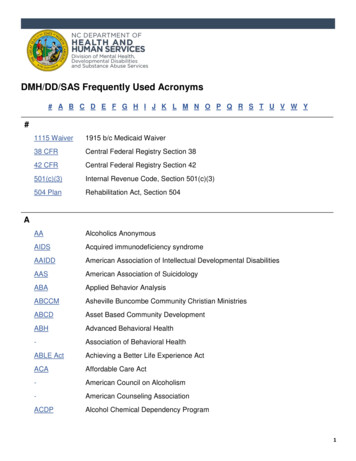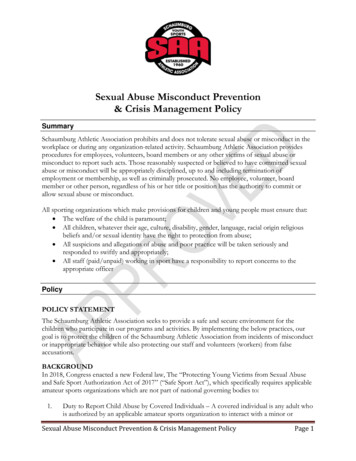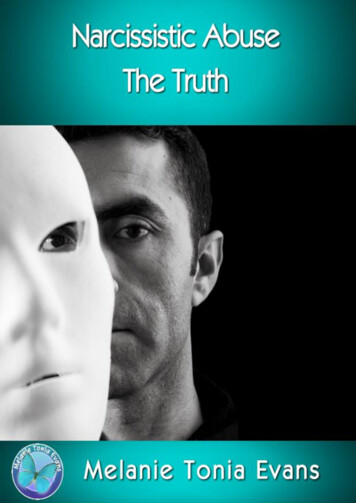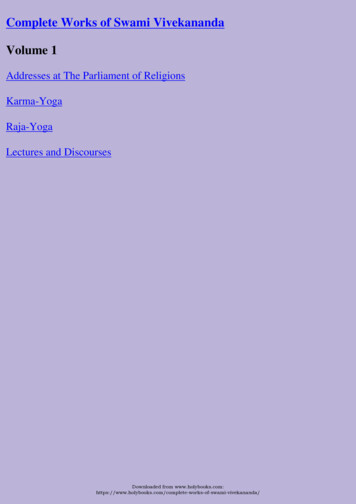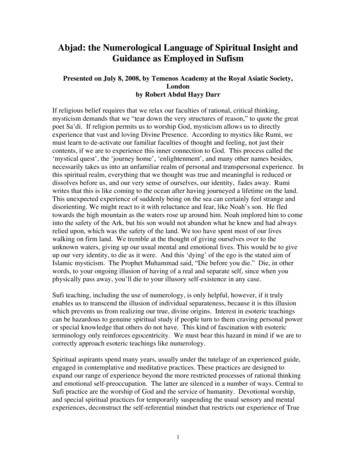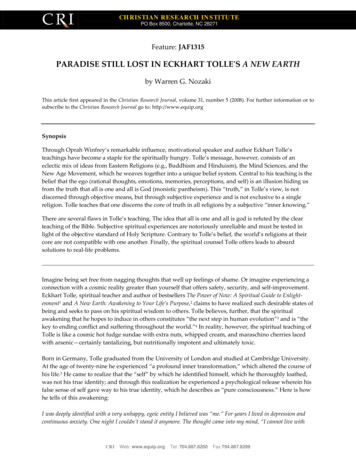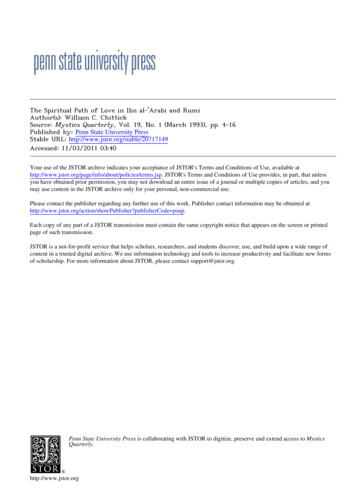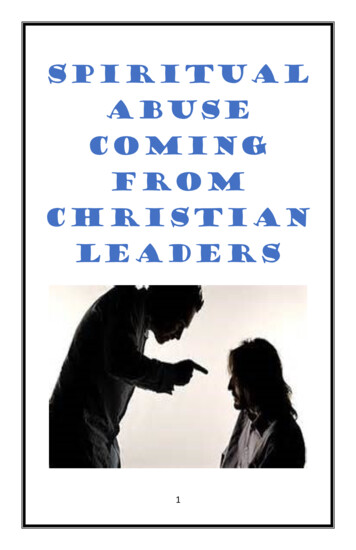
Transcription
1
An Overview of Spiritual Abuse Among Christians and TheirAuthoritarian Leaders Or: It’s My Way or the Highway!Have you ever, or are you presently involved in achurch body wherein you have either noticed, orfelt the following behaviors: a troubling, overreaching authority of a pastor, their spouse, the elders ordeacons of the church body, or simply some other personwho seeks recognition? It is a craving need for selfishattention that comes in some capacity of authority bydemanding attention, some measure of control, orinfluence beyond what is normally acceptable? Suchbehaviors are usually unsolicited and only benefit thoseexacting such an uplift of their status.Let’s take a look at recognizing and identifying thesebehaviors. Why do we want to focus on such unacceptablebehaviors? Because they lead to the possibility of what isdefined as “spiritual abuse.” This spiritual abuse causesdiscord, personal pain and agony, and sets in motion thewheels for establishing an unwanted “Jezebel spirit” ofnastiness, anguish, misery, or distress directly andindirectly on and among the church body, or varioustargeted individuals. This is not a heavenly behavior orattitude for any church body member or leader to possess.This kind of treatment is called spiritual abuse and it hasevil roots and inclinations which do not belong anywhere,let alone within the walls of a sanctuary of Christ. Whatcauses spiritual abuse in God’s territory where peace andharmony “only” should prevail and exist?2
Definition: Spiritual abuse is the misuse of a position ofpower, leadership, or influence to further the selfishinterests of someone other than the individual who needshelp. Sometimes abuse arises out of a doctrinal position.At other times it occurs because of legitimate personalneeds of a leader that are being met by illegitimate means.Spiritually abusive religious systems are sometimesdescribed as legalistic, mind controlling, religiouslyaddictive, and authoritarian. They are highly dangerous inthat they demeanor people within the church body, easilydenigrate and do injurious mental and emotional harm toindividuals which may easily result in spiritual abusewhich is painful, degrading and unwarranted by anyone,let alone a high positioned leader within the church body,i.e, the pastor of the church. Hmmmm?An authoritarian leadership style. God calls churchleaders to be servant-hearted, tender and compassionate.The apostle Paul told the Corinthians that he did not "havedominion over your faith" see 2 Corinthians 1:24, but3
that he served in humility alongside them. Immature,untested leaders may not know how to serve, and they mayend up wounding people with their harsh demands, threatsand dominating attitudes. You can be certain thatauthoritarian leaders do not submit their lives to anyone;they are “all about themselves,” and they are truly unfit tobe pastors.A secretive atmosphere. The word occult actually means"secret." And secrecy is always a hallmark of a spirituallyabusive church. Leaders are not transparent about theirown lives, they don't allow members to question anything,and the financial records of the church are closed. Ahealthy pastor encourages openness, welcomes input andinvites participation. You can be certain that if there issecrecy in a church, there is something to hide. Don'tsubmit yourself to such a system. But do pray for it tochange for the glory of God and not the minister or personin-charge of the sinfulness.Spiritual elitism. It's interesting that most cult-likechurches don't grow to be large, but there are severalexceptions. In the case of one waning church, which had4
shrunk to 20 extremely loyal members, in a spirituallytoxic environment, members were told they were the"elect few" or the "Green Berets" who are spirituallysuperior to others. Spiritually abusive churches often bashother denominations, insisting that their doctrines are bestand true. This becomes a breeding ground for strangeteachings. We live in a time when this kind of thinking isrunning rampant around the world. Too many people wantto be “special” in all the wrong ways.Financial manipulation. There's nothing wrong with achurch asking for money. God wants us to use ourresources to fund the spreading of the gospel and tosupport its ministers. But in unhealthy churches, peopleare coerced, berated or threatened at offering time. Onepastor was known for tracking his members' finances andpersonally demanded that they give their annual tax refundchecks in the offering. This is spiritual extortion. 2Corinthians 9:7-9 says giving should be done cheerfullyand without compulsion. “You must each decide in yourheart how much to give. And don’t give reluctantly or inresponse to pressure. “For God loves a person who givescheerfully.” And God will generously provide all youneed. Then you will always have everything you need andplenty left over to share with others. As the Scripturessay, “They share freely and give generously to the poor.Their good deeds will be remembered forever.”No respect for personal liberty. Some ministers maydemand that his assistant come to his house in the weehours of the morning to take dictation for sermons—as ifhe could not write his own study notes! This is5
unacceptable and a form of abuse as well. There have beensituations where church volunteers were forced to workunreasonably long hours and/or actually expected toperform chores or other house work for the pastor withouthesitation. Also, not acceptable. Mature Christian leaders,like the apostle Paul, view themselves as "bond-servantsfor Jesus' sake." 2 Corinthians 4:5 “You see, we don’tgo around preaching about ourselves. We preach thatJesus Christ is Lord, and we ourselves are your servantsfor Jesus’ sake. —and mature Christian leaders wouldnever treat people like slaves. If you see slavery in yourchurch, you can be sure the Holy Spirit is grieved. Wherethe Spirit of the Lord is, there is liberty!Hyper-spirituality. Leaders who have not been properlytrained or mentored will overcompensate for their lack ofexperience by pretending to have an inside track to God.Insecurity breeds pride. And in charismatic churcheswhere we believe in supernatural guidance, this pride canopen the door for weird forms of abuse. Before too long,the super-spiritual leader will invent excuses for his badbehavior by saying that "God told him" to do unreasonable6
or unbiblical things. When a leader claims an inside trackto God but never surrounds himself with godly counselors,watch out! He is headed for a train wreck and any lackeyshe does have at this side and beckon call, are also going tobe on that same train.Spiritual abuse experiences usually include: A leader above you telling you that even though you maybe burned out and losing your health, you had to stay inthe ministry because if you didn’t you would lose all yourgifting to do future ministry. A church that repeatedly is told that they basically havethe corner on the market of Jesus and that if they have togo elsewhere, they will miss God’s highest calling. A leader who finds ministry to be a vehicle for his owngreat gain, lying and manipulating donors to earn moreand more money, especially if they are afraid he may leave7
to go to another church. Hey! Let him go and buy him abus ticket! A ministry that shames you into doing their personalbidding and accepting their outside lifestyles, includingwhere you go, what hobbies you may have, what personalclubs you may be part of and even the television showsyou watch and the music you choose to listen to. The listgoes on, and it’s all about them and not you. Leaders may single you out, threaten you and chide youbecause you brought up a concern that others saw. If youare not an antagonist, which is one deplorable thing, youhad the right to make others aware of something that wasor is not right in the ministry of the preacher. Deal with it,and don’t dodge it.Get back! This isthe inner Circleand it is Secret!8
Spiritually abusive ministries and ministers usually. . .1. Have a distorted view of respect. They forget thesimple adage that respect is earned, not granted. Abusiveleaders demand respect without having earned it by good,honest living.2. Demand allegiance as proof of the follower’sallegiance to Christ. It’s either his/her way or thehighway. And if a follower deviates, he is guilty ofdeviating from Jesus.3. Use exclusive language. “We’re the only ministryreally following Jesus.” “We have all the right theology.”Believe their way of doing things, thinking theologically,or handling ministry and church is the only correct way.Everyone else is wrong, misguided or stupidly naive. TheBible is the right way without deviations, or detours intounchristian doctrines or the minister’s personal choice ofinterpretation. Always ask where what is being preachedor espoused can be found “in the Bible.” Where can thatdogma be found in the Bible?4. Create a culture of fear and shame. Often, there is nograce for someone who fails to live up to the church’s orministry’s expectation. And if someone steps outside ofthe often-unspoken rules, leaders shame them intocompliance. They can’t admit personal failure, but theyoften search out failure in others and use that knowledgeto hold others in fear and captivity. They often quoteScriptures about not touching God’s anointed or bringingaccusations against an elder. Yet they often confront sin in9
others, particularly ones who bring up legitimate biblicalissues. Or they have their circle of influence take on thistask, silencing critics. This behavior is very common,especially with insecure preachers or other apprehensive,diffident or reticent leaders in the church body.5. Often have a charismatic leader at the helm whostarts off well but slips into arrogance, protectionismand pride. Where a leader might start off beingpersonable and interested in others’ issues, he/sheeventually withdraws to a small group of “yes people” andisolates himself or herself from the needs of others. Suchbehavior harbors a cult of personality issues, and if thecentral figure of the ministry, perhaps the minister, left thechurch body, the cult-entity would collapse, as it wasentirely dependent on one person to hold the placetogether. We should only be relying on Jesus Christ andnot confiding with “Guru Gomahdi Mahhidi.”10
6. Cultivate a dependence on one leader or leaders forspiritual information. Personal discipleship isn’tencouraged. Often the Bible gets pushed away (somewhatlike Jim Jones) to the fringes, unless the main leader isteaching it.7. Demand servanthood of their followers, but liveprestigious, privileged lives. They live aloof from theirfollowers and justify their extravagance as God’s favorand approval on their ministry. Unlike Jesus’ instructionsto take the last seat, they often take the first seat at eventsand court others to grant them privileges.8. Buffer him/herself from criticism by placing peoplearound themselves whose only allegiance is to theleader. Views those who bring up issues as enemies.Those who were once friends/allies swiftly becomeenemies once a concern is raised. Sometimes, these folksare banished, told to be silent or shamed into submission.9. Hold to outward performance but reject authenticspirituality. Places burdens on followers to act a certain11
way, dress an acceptable way and have an acceptablelifestyle. Church body adherents must be a mirror imageof the minister. . .oh, but isn’t that supposed to be a mirrorimage of Christ? Hmmmm? Has your preacherbecome A Grand Pooh Pa in his own image and mind?Once again, Run! Run! Run!10. Use exclusivity for allegiance. Followers close to theleader or leaders feel like insiders. Everyone else is on theoutside, though they long to be in that inner circle.The idea of spiritual abuse is not a new phenomenon. Inthe Old Testament, God spoke against those who operatedin their own authority while abusing the very people theywere to bless. In Jeremiah 5:30-31 read, "An astonishingand horrible thing has been committed in the land: theprophets prophesy falsely, and the priests rule by theirown power; and My people love to have it so. But whatwill you do in the end?" God brought an indictmentagainst the religious leaders of the Old Testament. We seethe Lord's anger expressed against those who operate intheir own authority. Consumed with their own ambition,these leaders have convinced the people that their power12
is divine. Yet in reality, these false prophets are merelywielding their self-imposed influence for personal gain,claiming they speak for God.In Jeremiah 6:13-14 we read again of self-absorbedprophets and priests who are so preoccupied with theirown needs being met that the needs of the people are beingignored. "From the least of them even to the greatest ofthem, everyone is greedy for gain, and from the propheteven to the priest everyone deals falsely. And they havehealed the brokenness of My people superficially, saying,'Peace, peace,' but there is no peace." A commoncharacteristic of an abusive religious system is that the realneeds of the people are lost in the never-ending quest bythe leaders for personal fulfillment and happiness.Jesus Christ had big problems with the Pharisees of theNew Testament, whom He openly confronted concerningthe way they treated others. Read the New Testament, itdoesn't take a tremendous amount of insight to see that theconfrontations Jesus had were not with tax collectors,adulteresses, prostitutes or other “sinners.” Hisconfrontations were with the religious leaders and thereligious system of His day. Speaking about these abusingand selfish Pharisees, Jesus said, "For they bind heavyburdens, hard to bear, and lay them on men's shoulders;but they themselves will not move them with one of theirfingers." Matthew 23:4 Or for an even clearer picturefrom another version of the Bible: "They tie up heavyloads, hard to bear, and place them on men's shoulders,but they themselves will not lift a finger to help bearthem." Jesus is referring to the people being weighed13
down by rules and regulations that needed to be performedin order to gain the acceptance of the Pharisees. In thesame way, many believers today have found themselvescrushed beneath the religious baggage of an abusivesystem. Each day thousands of church members findthemselves struggling to earn the favor and approval of amodern-day Pharisee.Jesus cared deeply about His people and how they weretreated. When He saw the multitudes, "He was movedwith compassion for them, because they were weary andscattered, like sheep having no shepherd" Matthew 9:36Or in another Bible version it says. "They were bewildered(harassed and distressed and dejected and helpless), likesheep without a shepherd."14
Notice that Jesus saw them as harassed. This wordconveys the idea of some outside force pressing upon thepeople, causing them to feel weary, distressed anddowncast. This outside force was the religious system thatplaced its emphasis on outward appearances. It was asystem that promised peace based on one's ability tofollow the prescribed rules and regulations. If one failed,then there was judgment. This was direct spiritual abuseand if was unacceptable to the Lord. In fact, Hecondemned it, did He not?Not having a shepherd didn't mean that the people lackedfor those who told them what to do. There were plenty ofPharisees willing to do that. It meant they had no one tolead them to spiritual green pastures. A shepherd doesn'tdrive his sheep as cattlemen drive their cattle. A shepherdleads his sheep to a safe place where food is plentiful andwhere they can find rest. Is it any wonder Jesus said:"Come to Me, all you who labor and are heavy laden,and I will give you rest. Take My yoke upon you andlearn from Me, for I am gentle and lowly in heart, andyou will find rest for your souls. For My yoke is easy andMy burden is light." Matthew 11:28-3015
A healthy church body should produce peace and rest foreveryone’s soul. Establishing healthy spiritualrelationships will always be a challenge, but the processwill prevent you from becoming weary and worn, tryingto jump through religious hoops that promise God'sacceptance and love. If, in order to gain the acceptance ofits leaders, your church constantly requires more and moreof your life with no end in sight, and little encouragementalong the way, then you may want to re-examine thechurch body you are part of and just maybe move on towhere your yoke will diminish in being a burden on you.God's intention all along has been for His church body tobe healthy, life-giving, faith-centered, grace-centered, andChrist-centered. But because He has chosen to use frail,sin-prone individuals to lead His church, there is alwaysthe possibility that a church body may unsuspectingly fallinto deception or unhealthy spiritual patterns. You muststay alert to individuals who are considered to be “empirebuilders” and/or “power seekers” who demand thateverything goes “their way” or “the highway” for all thosethey tend to dominate without exception.God loves you and He doesn’t want to have to manageevery second of your life. He gave you a free will to makegodly choices, if you closely follow Him and Hiscommandments and desire for you. His way is best and itis not the proverbial highway.“When I think of all this, I fall to my knees and pray tothe Father, the Creator of everything in heaven and onearth. I pray that from his glorious, unlimited resources16
he will empower you with inner strength through hisSpirit. Then Christ will make his home in your heart asyou trust in him. Your roots will grow down into God’slove and keep you strong. And may you have the powerto understand, as all God’s people should, how wide, howlong, how high, and how deep his love is. May youexperience the love of Christ, though it is too great tounderstand fully. Then you will be made complete withall the fullness of life and power that comes from God.”Ephesians 3:14-1917
Booklet Number 15Covenant Christian MinistriesBelle Arden Run488 Mountain View DriveMosheim, Tennessee 37818-3524(423) 422-4711www.thewatchmansentinel.orgCopyright 2017Dahk Knox, Ph.D., Ed.D., D.Sc.Jan Knox, Ph.D.October 2, 2017(Monetary contributions are welcomed andappreciated for printing and postage expenses)All Rights Reserved 18
leaders demand respect without having earned it by good, honest living. 2. Demand allegiance as proof of the follower’s allegiance to Christ. It’s either his/her way or the highway. And if a follower deviates, he is guilty of deviating from Jesus. 3. Use excl

